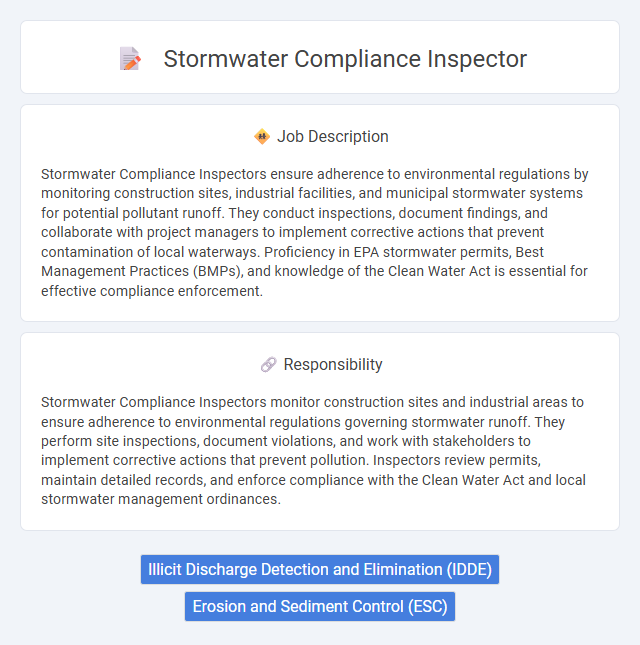
Stormwater Compliance Inspectors ensure adherence to environmental regulations by monitoring construction sites, industrial facilities, and municipal stormwater systems for potential pollutant runoff. They conduct inspections, document findings, and collaborate with project managers to implement corrective actions that prevent contamination of local waterways. Proficiency in EPA stormwater permits, Best Management Practices (BMPs), and knowledge of the Clean Water Act is essential for effective compliance enforcement.
Individuals with strong attention to detail and a willingness to conduct field inspections are likely to be well-suited for a Stormwater Compliance Inspector role. Those comfortable working outdoors in various weather conditions and able to identify potential environmental hazards may have a higher probability of success. Physical fitness and the ability to work independently or as part of a regulatory team might also influence suitability for this job.
Qualification
Stormwater Compliance Inspectors must possess strong knowledge of environmental regulations, including the Clean Water Act and local stormwater management ordinances. Candidates typically require a bachelor's degree in environmental science, civil engineering, or a related field, along with certifications such as Certified Stormwater Inspector (CSI) or Certified Professional in Erosion and Sediment Control (CPESC). Proven experience in site inspections, water quality monitoring, and report documentation is essential for effective compliance enforcement and environmental protection.
Responsibility
Stormwater Compliance Inspectors monitor construction sites and industrial areas to ensure adherence to environmental regulations governing stormwater runoff. They perform site inspections, document violations, and work with stakeholders to implement corrective actions that prevent pollution. Inspectors review permits, maintain detailed records, and enforce compliance with the Clean Water Act and local stormwater management ordinances.
Benefit
A Stormwater Compliance Inspector role probably offers significant benefits such as promoting environmental protection and public health through effective stormwater management. The position may provide opportunities for skill development in regulatory compliance and environmental monitoring. Job stability and potential for advancement within municipal or environmental agencies could be additional advantages.
Challenge
The Stormwater Compliance Inspector role likely involves navigating complex regulatory requirements while managing unpredictable environmental conditions. The challenge often centers on accurately identifying violations and ensuring corrective actions without disrupting ongoing development projects. There is probable pressure to maintain thorough documentation and stay updated on evolving stormwater regulations to mitigate potential legal and environmental risks.
Career Advancement
Stormwater Compliance Inspectors play a crucial role in enforcing environmental regulations to prevent water pollution and protect ecosystems. Career advancement opportunities include roles such as Environmental Compliance Manager, Senior Inspector, or Regulatory Affairs Specialist, often requiring additional certifications in environmental science or civil engineering. Gaining expertise in GIS technology, permit review, and environmental law can significantly enhance prospects for leadership positions within municipal or private environmental consulting firms.
Key Terms
Illicit Discharge Detection and Elimination (IDDE)
Stormwater Compliance Inspectors specialize in enforcing regulations related to Illicit Discharge Detection and Elimination (IDDE), identifying unauthorized pollutants entering stormwater systems through detailed site inspections and water quality testing. They utilize GIS mapping and field investigations to locate sources of illegal discharges such as industrial effluents, sewage leaks, and chemical runoff, ensuring adherence to local, state, and federal stormwater permits. Their role is critical in protecting water bodies from contamination, supporting environmental sustainability, and maintaining compliance with the Clean Water Act guidelines.
Erosion and Sediment Control (ESC)
Stormwater Compliance Inspectors specialize in monitoring and enforcing Erosion and Sediment Control (ESC) measures to prevent soil erosion and sediment runoff at construction sites. They conduct thorough site inspections to ensure compliance with local, state, and federal regulations, documenting any violations and recommending corrective actions. Proficient in interpreting ESC plans, these inspectors play a critical role in protecting water quality by overseeing sediment barriers, silt fences, and stabilization practices.
 kuljobs.com
kuljobs.com